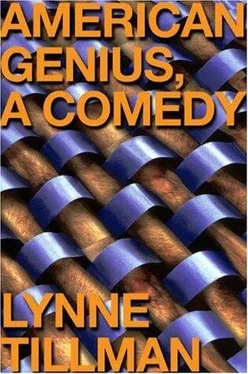In one year, three people inimical to me died, so my patch of territory opened up, I breathed more fully when I walked around in it, knowing I couldn't meet them, and though I didn't wish death on them and hadn't ever considered it, since I never thought of them except when they screeched into view like two cars crashing, my three putative enemies uncannily died in the same year within months of each other. Ever since, this fact, for it is, has held a perverse satisfaction and terror for me, and I have recalled my unimportant enemies more than I did when they were alive, since death keeps its own accounts including those labeled coincident fates. They might have been or become obstacles to me, though I don't believe their interests or fates were sufficiently entwined in mine to have made them the obstacles the tarot reader addressed. In an obituary notice, one was cited for his charitable work. Another, before her untimely demise at forty-three, was caught redhanded embezzling from her mother who was under her care, though she had previously married a damaged, aggressive man who assaulted her and so she was pitied. The third was distinguished by his not being particularly bad or good, yet each, at a certain time and in a specific manner, had disturbed my peace of mind.
A cardboard angel drops out of a notebook, a memento from a scholarly Irishwoman who befriended me in London, when I was there for two months, and who told me, one chilly afternoon, of her boredom with life. I was too young, without experience, I didn't understand her meaning, but now I think I do. Her mind instantly mandated the establishment of a foreign country, which I wanted to visit, she studied angels, but I refrained from asking too many questions and imposing on her time, and anyway I might not have been able to understand her or her belief in angels. Here, this morning, a blond-haired girl from Oklahoma rushed past me, brushing against my body nervously, even aggressively, as I walked toward the dining room, and this has happened especially when she has noticed that I have mail, and she doesn't. She has been here longer than I, we have never spoken, she is usually at the women's table, an informal congregation that takes shape from time to time, as does a men's table. Occasionally I decide I will inquire about her, delve into a relationship, but as she brushes past me, in the manner she did this morning before I entered the dining room, when I then rushed past the disconsolate women to the kitchen, I am confirmed in cny decision not to engage her. I know only that she has a number of allergies to unlikely foods and has caused the head cook consternation. If I had lived in the scholar's Ireland, in the early part of the 20th century, I would have a troubled relationship to God, with sin, not to poetry but to politics, and, I imagine, irritated nipples rubbed raw from the starched white sheets on beds in cold bedrooms. In her Ireland, I sit on a stiff, horsehair-covered chair near the fire, watching her long wavy blond hair as it drops onto the back of a chair, where, with scissors shaped like angel's wings, she clips pictures of angels and cherubs from one book and pastes them into another. On those chilly days, by artificial fires or electric heaters in London, she told me about chilblains and, because my skin is sensitive, I was prone to them, or vulnerable, and usually I sat near the fire with my hands and arms over my forelegs to shield them. Then my hands became chapped and red like hers and many English people's.
Many English people, with whose country America has a lasting and broken kinship, once had red, chapped hands from sitting in front of electric fires, many still resist central heating, and believe a cold room is good for them, though mostly they aren't Puritans. I like watching a fire, not an electric fire, which doesn't change, and I like watching TV, which changes and doesn't change, like a fire changes and stays the same, a recognizable blur of blue, purple, yellow, orange, and red flames, to my mind also numbers, leaping about, borrowing evanescent shapes, and with just a sheet of newspaper tossed casually onto it, roars approval and grows bigger and bigger. It can also become boring and dull, the way anything can, especially when you get older, mature and still dependent on the people you love and hate, and increasingly on novelty and surprise. So I like to make the fire grow, to make it huge and magnificent, to have it consume everything, and feed it like a child, nourishing it until I lose interest, which I shouldn't if it were a child, but my fear is that the fire will get out of hand and take over, overwhelm me, which is probably also what I want, an insane desire. A magnificent erection shown to me and for me in its first glory is moving and overwhelming, an obvious sign of pleasure, one that cannot be missed or obscured, though its source can be misunderstood, like imagining its hardness is for you alone when in fact it could he for anyone. A fire is always the same and yet different and could become uncontrollable, like the kitchen helper, were I to fan his flame and our nascent fantasy, since he is of scant reality to me, even though he is a daily piece in it. I like burning things, I like undoing and unmaking things, nowadays I take apart what I put together, pull one sticky side from the other, then scatter the bits on a table or the floor to see its fractured entirety. It's innocent behavior, no one gets hurt, there was a whole object and then there's an object ripped apart.
It is at these moments especially that I miss my cat. He might be uncontrollable, wild or just independent, he may always be frightened of people, but he is my cat, and if I imagine him dead or lost, I become distressed, even griefstricken. We are not allowed to have animals here, it is strictly forbidden, and many people miss their animals, figure out elaborate ways of visiting them, or have them lodged, though I know a man, he called himself an inventor, who kept his dog in a disused barn on the bounded property, and did not get into trouble, even when he was found out finally, since later he was allowed to return and took the same room and barn for himself. I remember him vividly because one night he stood on the balcony in the main hall and dropped his jeans and jockey shorts and exposed his well-shaped, rosy ass to everyone-the guy's callipygous, someone shouted. His ass was pink, startling, its flesh sublime against the dark wood of the old large room, and its shape, like two halves of a ripe peach, and though having this image was an embarrassment then, it maintains itself. A spark of sexual interest ignited, the way a dog's might in sniffing another dog's ass, but it passed, yet, like his ass, the interest was also surprising, but sublime, carrying beauty and horror. The inventor always returns with his dog, though I have not seen him again. Time has passed, all we have is time, prosaically, and there's nothing that is not in some way affected by time's passage, so anything anyone makes, does, doesn't do, or thinks is in debt to time, and all must pay their debt.
The tall balding man owes a debt to the disconsolate, psoriatic woman, I can tell he has promised her something, so their union does compromise her time and his, he's engaged himself to her in his cryptic way, and it is usually better not to become intimate with another while in this community, because complications arise that must be faced at breakfast and dinner, though lunch is taken alone and then everything and everyone may be avoided, but seclusion comes to an end, always, with a generally unsatisfactory meal, and the person or persons whom you've contracted to yourself for a short or long while, in subtle, unspoken, muted, or direct ways, steps forward and wants something, everyone wants something. I do, often. Limitlessly I want, since I don't know when to stop. The tall balding man runs daily, for hours and hours, he runs up mountains, ablaze, hoping to better his speed to the peak, and he might have a case of anorexia athletica, which must bind him, sympathetically, to the psoriatic one, whose eating habits parallel his excessive exercising. He can't stop racing, his head high as he runs along the road, his lanky, muscular legs moving like a machine's under him, his chest thrusting against a brisk wind, and always he is sweating, shunting off fluids, his palms especially, the effect of primary palmar hyperhidrosis, and also he glows, but his skin is taut, his cheeks sunken. He is considered healthy since he achieves much physically, but his will to stay in shape unnerves me, though the Contesa insists he is a great success with women, and she supposes its because he runs.
Читать дальше












